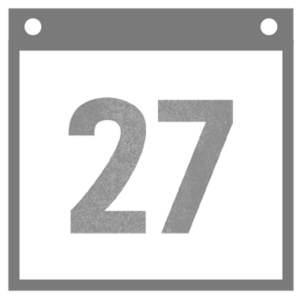Picture your Hebrew and Greek education as a parable of walking along the beach. You hear a voice that says, “Pick up some stones and put them in your pocket. Tomorrow, you will be both happy and sad.” You pick up the stones, put them in your pocket, and the next day you find they have transformed into a handful of diamonds. You would say to yourself, “This is so valuable. I wish I could go back and get more.”
Perhaps you find yourself at the end of your languages education. You still have a solid (or not-so-solid!) grasp of the basics of Hebrew and Greek, but you want to make sure you maintain all you have learned. If so, it’s never been easier to both maintain and grow your Greek skills. Think of John Brown. When his parents died when he was 11 or 12, he barely knew how to read English. He taught himself Latin during his break from shepherding work, and taught himself Greek by comparing Latin and English with a Greek New Testament he borrowed. Now, life’s a lot easier than it was 300 years ago. Think also of Heinrich Bitzer, whom John Piper writes about in Brothers, We Are Not Professionals. He was a full-time banker, working from 50-60 hours a week, but he loved the Hebrew Old Testament and the Greek New Testament. He even wrote a devotional book full of both Hebrew and Greek entries. It’s easier for us, with all our resources and tools, than it has ever been.
But perhaps you find yourself in a different situation. You don’t need your Greek merely improved; you need it resurrected. When I recently taught a Greek Review course, I was very pleased to meet people who were not afraid to say, “It’s been a long time since I had Greek. I’ve forgotten so much, but I’m committed to relearning it.” I had a student who took Greek 20 years ago, and when he took Greek with me a year or two ago, he told me, “I’ve forgotten the alphabet.” He had to relearn the alphabet before he took the class! He took a week or two off work, had a friend tutor him, took Greek review, and watched some old videos online. In about three weeks, his Greek was back up and improving at a steady pace. It is possible to do this. But how?
01 Develop habits

In his book What’s Best Next, Matt Perman points out that one of the best things we can do for our productivity is build habits and routines. We need to deliberately develop such patterns to show what we really value. I think that’s good advice. A 2009 article in the European Journal of Social Psychology followed people to determine how long it took them to form a habit. It varied greatly, but the average was 66 days. Some people were able to form a habit and stay with it after 18 days, but the longest amount of time was 254 days.
In January, some of us made resolutions about what we were going to eat or what we were going to read. It’s so easy to see our new habits slip after two or three weeks. We realize ultimately that it is only God who changes us from the inside and gives us the strength to do these things, but if these habits are not able to take hold in our lives, it’s no surprise our Greek skills slowly wander away. Greek is like the neighborhood cat — if you don’t feed it, eventually it will leave. So we want to be people who are feeding it, who are reading it regularly.
02 Eliminate distractions
Another practical tip is to be radical in eliminating distractions. I heard a speaker say once, “If I printed out all the stuff I look at on the internet — all the pictures, all the articles, all the videos — and I put it in a book, it would be the worst book ever.” In other words, we’re spending our time on things we do not value that much. There’s an article in the Harvard Business Review by Hugh McGuire showing that Twitter, email, and smartphone technology trigger a patterned dopamine reaction in your brain. The activity becomes almost numbing.
![]() Ask yourself: “Where am I spending my time?” Be willing to radically intervene and to take steps to reverse that addictive process. You could also try something called a little bit of theological jiu jitsu. The Brazilian martial art jiu jitsu is where you use the force of your opponent against them. Technology can be addictive, so we take our phones and remove those addictive apps (Facebook, Instagram, wherever you’re wasting your time) and you put things like Bible vocab and Biblearc (the digital Greek New Testament) on there. Put apps on your phone that you want to value more than Star Wars “Bad Lip Reading” videos.
Ask yourself: “Where am I spending my time?” Be willing to radically intervene and to take steps to reverse that addictive process. You could also try something called a little bit of theological jiu jitsu. The Brazilian martial art jiu jitsu is where you use the force of your opponent against them. Technology can be addictive, so we take our phones and remove those addictive apps (Facebook, Instagram, wherever you’re wasting your time) and you put things like Bible vocab and Biblearc (the digital Greek New Testament) on there. Put apps on your phone that you want to value more than Star Wars “Bad Lip Reading” videos.
03 Write down your goals

If you set a goal, write it down. If you’ve ever set a goal for yourself, chances are good you did so around New Year’s Day. The literature about goal setting says there are two reasons most people don’t keep their resolutions: Their goals are not realistic and they are not measurable. Someone recently told me they were going to go work on Greek an hour every day. It won’t happen! You won’t do it. Start at 5-10 minutes, and you will certainly do it, and that can grow. Start with a habit that is realistic. I’m going to give an inspirational word next: Aim low. Set realistic goals. Why do I keep my “Daily Dose of Greek” at two minutes? Because research shows people stop watching videos at 90 seconds. You’re not going to do all of this. This is overwhelming; don’t do all of this. But pick one of these things, and say, “I can do that.”
04 Motivate yourself

Another practical suggestion is to include incentives and disincentives. This is one reason that good intentions never take hold. When I have to write a lot, I tell my kids, “When I come home, ask me if I did anything other than write. If I did, I owe you each five bucks.” I’m so cheap, I don’t want to lose $15! Find something unpleasant that you don’t want to do. Commit to reading the Greek New Testament five minutes a day, five days a week. Put a chart on the fridge and tell your wife, “If you ever catch me on a day when I don’t do it, I’ll clean all the bathrooms that weekend.” She will check the chart, and if she catches you, you probably won’t do it again.
05 Get expert help
When you’re really sick, you go to the doctor. When your car is broken, you go to the mechanic. When something is wrong with your plumbing, you go to the plumber. What does it look like to seek expert help for your Greek? It could be taking a class at the seminary, it could be hiring a Ph.D. student to Skype with you and help you with your Greek once a week. Why do people pay a personal trainer when they could just go exercise? Because it really helps to have someone there with you who knows what they’re doing and is pushing you, and that’s just as true academically.
 There was a Freakanomics podcast, “How to Be Great at Just About Anything,” which looked at research of the psychologist Anders Erickson. He studied athletes, doctors, and artists who were at their peak performance to discover what made them excellent. Malcolm Gladwell, who popularized his work, wrote that 10,000 hours will make you great at anything. When they interviewed Erickson, it was not just the amount of time you invest. It’s also dependent on deliberate practice. It requires working on areas to improve your skills, often with an expert’s guided assistance. So, don’t just do something over and over again, but do it deliberately, especially with expert help.
There was a Freakanomics podcast, “How to Be Great at Just About Anything,” which looked at research of the psychologist Anders Erickson. He studied athletes, doctors, and artists who were at their peak performance to discover what made them excellent. Malcolm Gladwell, who popularized his work, wrote that 10,000 hours will make you great at anything. When they interviewed Erickson, it was not just the amount of time you invest. It’s also dependent on deliberate practice. It requires working on areas to improve your skills, often with an expert’s guided assistance. So, don’t just do something over and over again, but do it deliberately, especially with expert help.
06 Visualize the future
God has given us imaginations so that we can imagine what the future could be. Boyce and Broadus over 150 years ago imagined what the future it could be for the seminary and here we are — beyond anything they could have expected. We see this in sports with people like Michael Phelps; before he swims, he sees the whole race in his mind. God has given us visual memory to inspire and keep us on track.
In a recent Guidestone retirement newsletter, they reported a study where half of the people in a group were shown age progression software to show them what they would look like when they were 70 or 80 years old. Participants who saw the age progression were told, “This is what you’re going to look like. Your body looks frail. Imagine you need money, so you get up at 4 a.m. to work at the grocery, stocking shelves, to get food on the table.” The other half of the group received no coached vizualization of the future. It’s no surprise that the people who envisioned themselves in retirement ended up saving twice as much money as the control group because they emotionally connected with a vision of the future they did not want to have.
We could say the same thing with your Greek. Imagine that your grandkids are pulling your books off the shelf and they say, What’s this book that’s all dusty? “Oh that’s my Greek New Testament?” Do you read Greek? “No, I used to.” Why can’t you read it? Can you read this, Granddad? Can you read this one word? “I can’t read that word.”
On the other hand, imagine that you’re 85, and that you have a Greek New Testament with the cover torn off and every page is crinkled with sweat and writing. And when you want to pick up the New Testament, you don’t pick up an English Bible but you pick up your Greek New Testament, which you’ve read through many times. Which vision do you want to your life to be about?
This article was adapted from the opening plenary session of the Jan. 13-14 Alumni Academy on “The Minister and His Greek New Testament,” presented by Robert L. Plummer, professor of New Testament Interpretation and co-author of the forthcoming book Greek for Life, which releases in August through Baker Publishing Group.




